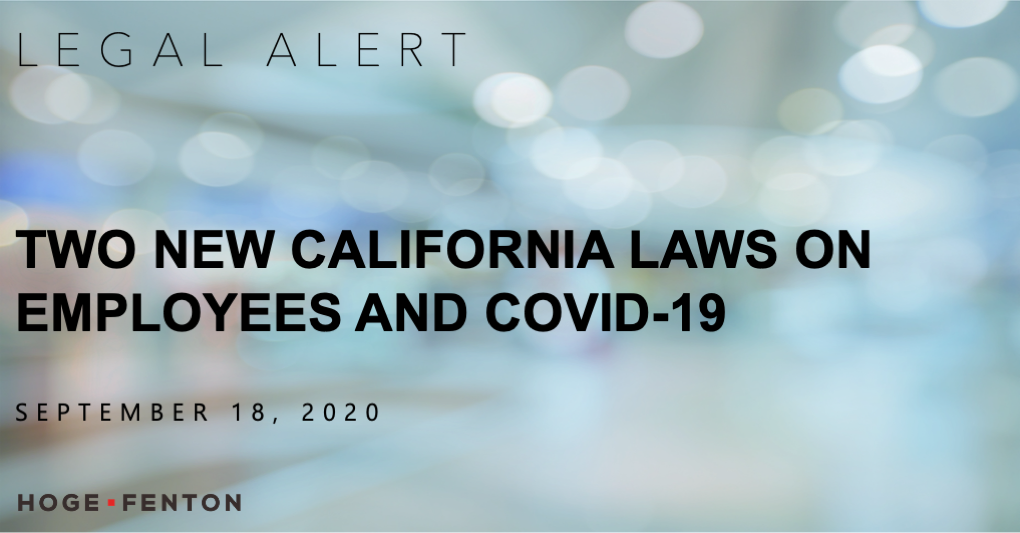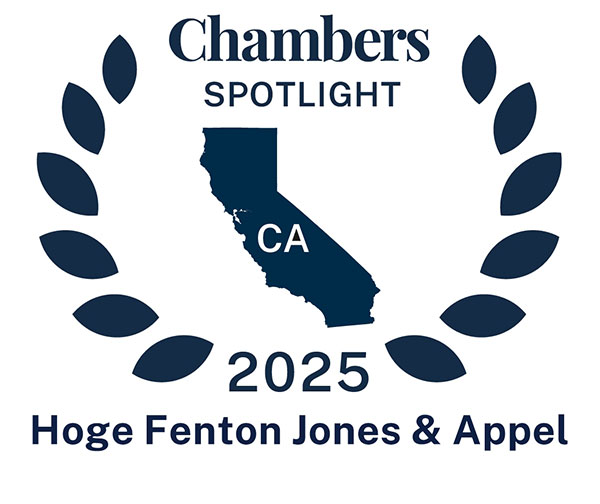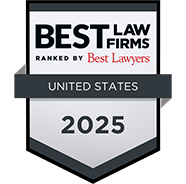Two New California Laws on Employees and COVID-19
By Hoge Fenton | 09.21.2020 | Client Alerts

by Sarju Naran, Shareholder and Chair, Employment Law Group
On September 17, 2020, Gov. Gavin Newsom signed two employment law bills pertaining to COVID-19: Senate Bill (SB) 1159 and Assembly Bill (AB) 685.
SB 1159
As many employers recall, Governor Newsom signed a 60-day Executive Order in May 2020 that created a rebuttable presumption that employees who tested positive for COVID-19 within 14 days of being at a worksite had a workers’ compensation claim. The order expired on July 5, 2020, leading employers to believe that the burden had shifted back to employees to establish that they were infected with COVID-19 in the course of their employment. SB 1159 now affords employees the same rebuttable presumption retroactive to July 6, 2020 and extending through January 1, 2023, but only if the company has 5 or more employees, and only if the employee tests positive for COVID-19 during an “outbreak” at the employee’s worksite. SB 1159 defines “outbreak” based on employee headcount: (1) for employers with 100 or fewer employees at the worksite, an outbreak means 4 or more employees test positive within a 14-day period; (2) for employers with more than 100 employees at the worksite, an outbreak means at least 4% of the employees test positive within a 14-day period.
SB 1159 also extends the rebuttable presumption to first responders and employees in the health care field.
Employers can submit evidence to attempt to rebut the presumption, including but not limited to, “evidence of measures in place to reduce potential transmission of COVID-19 in the employee’s place of employment and evidence of an employee’s nonoccupational risks of COVID-19 infection.”
SB 1159 also requires employers with 5 or more employees to notify their workers’ compensation carrier within 30 days from the passage of the law about employees who have tested positive since July 6, 2020; going forward, employers are required to report positive tests within 3 days of being notified of an employee’s positive test.
Because SB 1159 was passed as an emergency measure, it is effective immediately.
AB 685
AB 685 requires employers to notify all employees within 1 business day if the employer receives notice that an employee at the worksite was potentially exposed to COVID-19. Employers are also required to provide the employees with “information regarding COVID-19-related benefits to which the employee may be entitled under applicable federal, state, or local laws, including, but not limited to, workers’ compensation, and options for exposed employees, including COVID-19-related leave, company sick leave, state-mandated leave, supplemental sick leave, or negotiated leave provisions, as well as anti-retaliation and anti-discrimination protections of the employee.” Employers must also provide notice of the disinfection and safety plan that the employer plans to implement and complete per the guidelines of the federal Centers for Disease Control.
Additional notice is required if the employees belong to a union and have an exclusive representative.
Further, employers must also notify local public health officials within 48 hours if the number of positive cases meets the State Department of Public Health’s definition of an “outbreak.”
Have a dispute with an employee, or questions regarding employees and COVID-19?
Contact our Employment Law Group at info@hogefenton.com.
Meet Our Employment Law Group
 |
Sarju Naran is a zealous advocate for his clients and approaches litigation with creativity and strategy. Chair of Hoge Fenton’s Employment Law Group, Sarju’s experience spans from representing middle-market and family-owned closely held businesses to large multi-national companies. He regularly litigates and provides advice and counsel to companies on wage and hour issues, trade secret misappropriation, employee mobility, wrongful termination, performance management, and leaves of absence. |
 |
Jenn Protas helps employers navigate California’s numerous employment laws and defends employers with an eye toward successful, yet cost-effective resolution. Jenn is a committed advocate for her clients and a tenacious litigator. She defends employers on matters related to wage and hour law, wrongful termination, harassment, discrimination, and retaliation in single-plaintiff litigation, Private Attorney General Act actions, and/or class actions. Jenn’s practice also includes housing discrimination matters and business litigation. |
 |
Embert Madison, Jr. focuses on employment advice and counsel, cannabis regulation, and real estate matters. He has represented clients throughout California. Embert spent several years as an attorney in the California Capitol. During this time, he “toed the political ropes” in the areas of employment, taxation and real estate for a California Assembly Member and served in the Office of Legislative Counsel. |
 |
Ashlee Cherry is an experienced litigator and represents clients with employment law needs ranging from wage and hour disputes and wrongful termination to disability and leave matters. Ashlee is a board member of the Santa Clara County Employer Advisory Council (EAC). |
 |
Laura Riparbelli aggressively litigates employment law disputes. Laura has handled all aspects of litigation from start to finish, including second chairing three bench trials. She regularly prepares and argues challenges to initial pleadings, discovery disputes, and dispositive motions. Laura adeptly navigates all facets of the written and oral discovery process. |
This information is provided as an educational service by Hoge Fenton for clients and friends of the firm. This communique is an overview only, and should not be construed as legal advice or advice to take any specific action. Please be sure to consult a knowledgeable professional with assistance with your particular legal issue. © 2020 Hoge Fenton










